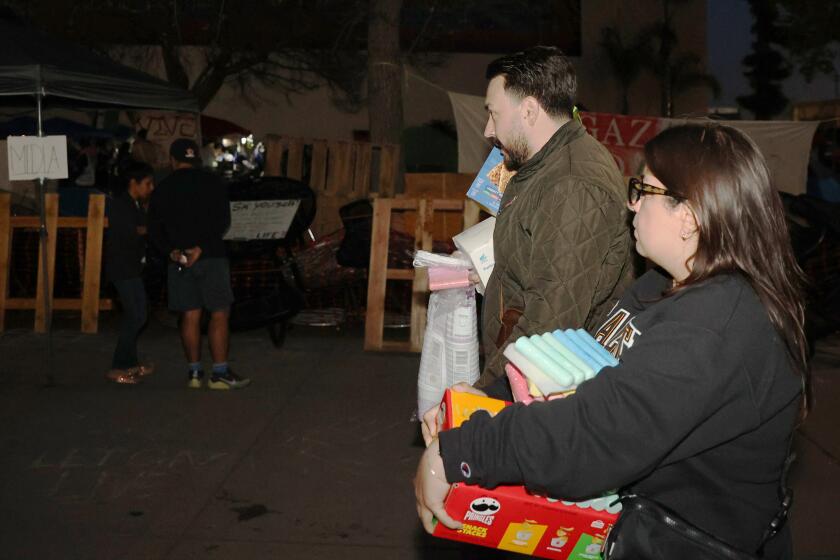A Hunger for Change : Protest: Students from the central city join the fight for Chicano studies department. The fact those classes aren’t offered ‘sets the tone’ for racism, says one.
For Maria Lara, the road that led to her taking part in a hunger strike for a Chicano studies department at UCLA traveled through the Eastside and South-Central.
Lara, 21, is a Roosevelt High School graduate and often catches a bus from her South-Central neighborhood for the 1 1/2-hour trip to UCLA. Lara decided to fast after realizing that other protests, one of which resulted in the arrest of 89 students on trespassing and vandalism charges, had not changed the administration’s decision about Chicano studies on campus.
“I started to crystallize in my mind that there’s racism in this university, but other than the individual racist acts, the institution serves the purpose as a racist institution,” said Lara, a junior studying political science and education.
“A lot of people seem to think that the Mexican culture is at fault for many students not coming to a university, that the Mexican students are not serious. People have told me they heard that people live in the barrios because they want to. The fact that we don’t even have certain classes on campus sets the tone for that.”
The protests and the May 25 beginning of the hunger strike came after UCLA Chancellor Charles E. Young’s denied requests to establish an independent Chicano studies department. At any given time, an unknown number of students were also observing two-day fasts.
Young said he preferred to improve the existing Chicano studies program with a new policy giving interdisciplinary programs more power in decisions involving the hiring of professors. The hunger strike had not changed his mind.
Supporters say that Chicano studies is deserving of its own department, given that Latinos make up 40% of the county.
In the central city, where half the households are Spanish-speaking, the students were finding support. Mothers of East L.A. was among several community groups that circulated petitions calling for a Chicano studies department. The petitions were turned over to Young’s office last week.
State Sen. Art Torres (D-Los Angeles) also supported the students by attending several demonstrations, and Eastside Assemblyman Richard Polanco (D-Los Angeles) introduced a resolution requesting that UCLA establish a Chicano studies department.
Students said the cause carries a deeper meaning for them than most people can appreciate. They said they have endured comments questioning their intelligence, commitment to education and legal status, among others.
Cristine Soto, a third-year Chicano studies major, saw Young’s decision as representative of how UCLA regards Latinos.
“They treat you like you don’t belong here, that you got here on special status because you’re a minority or because you’re an athlete and you’re not at the same educational level as everyone else,” said Soto, 20, who was assisting the hunger strikers.
Carlos Palomo, 21, a social psychology and Chicano studies student, started the hunger strike with the rest but quit after four days. He decided he could be more helpful to the cause in other ways.
“This is going to be a big example for us for a lot of things,” said Palomo, a Roosevelt High graduate. “We’ve learned organization, communication, administration. . . . This has been one of the most educational experiences.”
More to Read
Start your day right
Sign up for Essential California for news, features and recommendations from the L.A. Times and beyond in your inbox six days a week.
You may occasionally receive promotional content from the Los Angeles Times.






